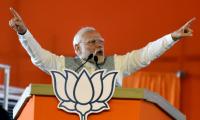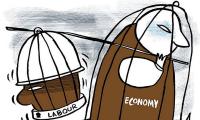PwC: Granular Approach for Biz Support & Job Creation
PwC India Chair Sanjeev Krishan emphasizes a granular approach to support small businesses and job creation for inclusive growth. He advocates for targeted initiatives, infrastructure development, and fostering ancillary industries.

New Delhi, Jun 12 (PTI) The Modi 3.0 government needs to adopt granular and tailored approach to support small businesses and promote job creations to make the economic growth more inclusive, said PwC in India Chairperson Sanjeev Krishan.
Supporting the development of ancillary industries, and sharper focus on urban and rural development projects as part of infrastructure creation should be other priorities of the government, Krishan said.
"Prioritising job creation and productivity improvement is crucial for the new government to ensure inclusive growth," he told PTI.
He noted that over the past decade, improvements in ease of doing business (EoDB) along with better infrastructure and credit access have removed several obstacles.
"What would now be important will be to support job creation/increasing trade in smaller pockets with a granular and tailored approach. Simultaneously, increasing productivity would be equally important. Regulatory support and incentivisation, including PLI schemes, can help drive innovation," he said.
Krishan said promoting plug-and-play research hubs which could be managed by the government or private players could reduce entry barriers and provide an impetus for startups.
While the government did announce a budgetary allocation towards R&D in the interim budget, accelerated deployment and even expansion of that pool will be critical.
He made a case for supporting the development of ancillary industries which feed into sunrise sectors such as renewables, electric mobility, semiconductors, and artificial intelligence.
"Initiatives around improving access to credit and development of dedicated corridors will not only create employment opportunities and strengthen supply chains, but also help position India as an attractive manufacturing destination globally and increase the Gross Value Added," he said.
He also stressed that in addition to projects like Dedicated Freight Corridors (DFCs), there needs to be a sharper focus on urban and rural development projects.
Strengthening agricultural infrastructure and improving the farm-to-table supply chain would strengthen the country's position in terms of food security and contribute to improved returns for farmers, driving rural purchasing power, he said.
"These areas are intricately linked - and forging partnerships with academia would help in job and value creation, supporting MSMEs and navigating the complexities of the global landscape while ensuring India's continued economic growth," said the chairperson.
On the economic growth prospects during the current fiscal, he said sustained policy stability, deepening economic reforms and high infrastructure investment have driven India's recent growth.
He said anticipated improvements in rural consumption and agricultural trends together with a forecast of a good monsoon are boosting optimism.
Urbanisation will be another catalyst in India's progress by fostering economic opportunities, improving infrastructure, and enhancing access - driving inclusive development and bridging the urban-rural divide. This focus on infrastructure development would also enhance India's global appeal, creating opportunities in the tourism space.
Supporting the development of ancillary industries, and sharper focus on urban and rural development projects as part of infrastructure creation should be other priorities of the government, Krishan said.
"Prioritising job creation and productivity improvement is crucial for the new government to ensure inclusive growth," he told PTI.
He noted that over the past decade, improvements in ease of doing business (EoDB) along with better infrastructure and credit access have removed several obstacles.
"What would now be important will be to support job creation/increasing trade in smaller pockets with a granular and tailored approach. Simultaneously, increasing productivity would be equally important. Regulatory support and incentivisation, including PLI schemes, can help drive innovation," he said.
Krishan said promoting plug-and-play research hubs which could be managed by the government or private players could reduce entry barriers and provide an impetus for startups.
While the government did announce a budgetary allocation towards R&D in the interim budget, accelerated deployment and even expansion of that pool will be critical.
He made a case for supporting the development of ancillary industries which feed into sunrise sectors such as renewables, electric mobility, semiconductors, and artificial intelligence.
"Initiatives around improving access to credit and development of dedicated corridors will not only create employment opportunities and strengthen supply chains, but also help position India as an attractive manufacturing destination globally and increase the Gross Value Added," he said.
He also stressed that in addition to projects like Dedicated Freight Corridors (DFCs), there needs to be a sharper focus on urban and rural development projects.
Strengthening agricultural infrastructure and improving the farm-to-table supply chain would strengthen the country's position in terms of food security and contribute to improved returns for farmers, driving rural purchasing power, he said.
"These areas are intricately linked - and forging partnerships with academia would help in job and value creation, supporting MSMEs and navigating the complexities of the global landscape while ensuring India's continued economic growth," said the chairperson.
On the economic growth prospects during the current fiscal, he said sustained policy stability, deepening economic reforms and high infrastructure investment have driven India's recent growth.
He said anticipated improvements in rural consumption and agricultural trends together with a forecast of a good monsoon are boosting optimism.
Urbanisation will be another catalyst in India's progress by fostering economic opportunities, improving infrastructure, and enhancing access - driving inclusive development and bridging the urban-rural divide. This focus on infrastructure development would also enhance India's global appeal, creating opportunities in the tourism space.
You May Like To Read
Read More On:
pwcindiaeconomic growthjob creationsmall businessesgranular approachinfrastructure developmentancillary industriesurban developmentrural developmentease of doing businesseodbpli schemesresearch hubsstartupsrenewableselectric mobilitysemiconductorsartificial intelligencededicated freight corridorsdfcsagriculturefarm-to-tablefood securitymsmesglobal landscapepolicy stabilityeconomic reformsinfrastructure investmentrural consumptionagricultural trendsmonsoonurbanizationinclusive developmenttourismTODAY'S MOST TRADED COMPANIES
- Company Name
- Price
- Volume
- Vodafone-Idea-L
- 11.65 (+ 3.56)
- 106772451
- Alstone-Textiles
- 0.28 ( -3.45)
- 44187760
- Mangalam-Industrial
- 0.88 ( -2.22)
- 39177573
- Sunshine-Capital
- 0.27 (+ 3.85)
- 35956340
- GMR-Airports
- 104.40 (+ 6.37)
- 30453005





